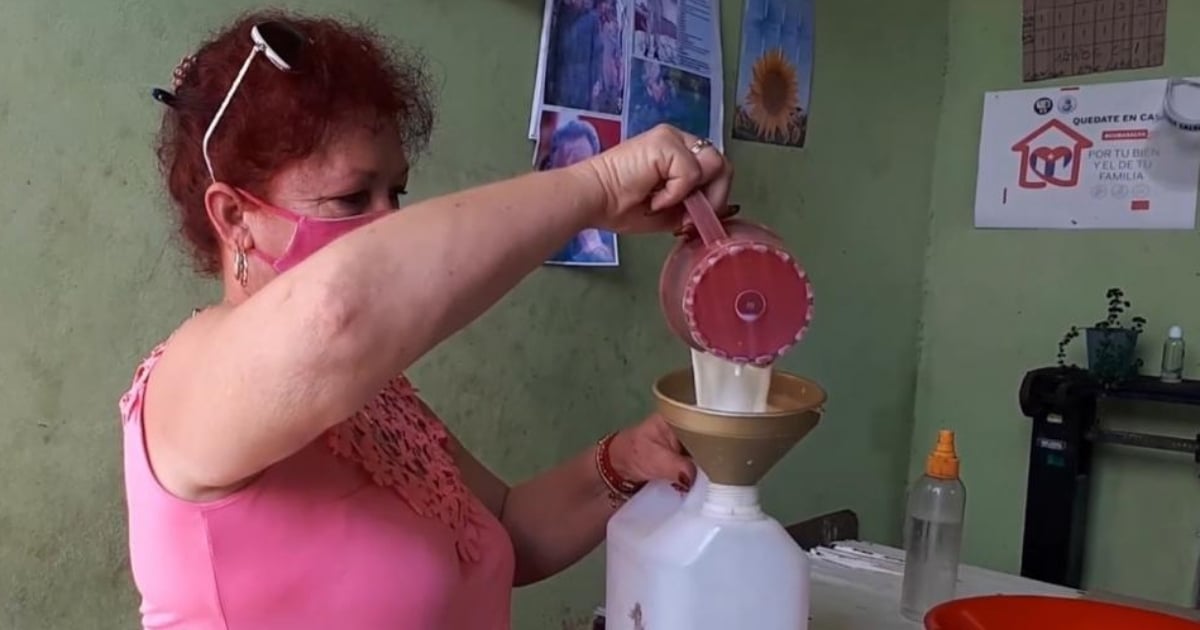
Amid the severe supply crisis affecting Cuba, the Dairy Products Company of Matanzas has implemented emergency measures to address the shortage of powdered milk in the country.
Reynaldo Ramírez Martínez, the commercial director of the company, explained to the state-run newspaper Girón that the adjustments directly affect thousands of children, who now receive reduced amounts of liquid milk based on their age.
According to the executive, children between 1 and 2 years old currently receive 917 milliliters of liquid milk daily. However, those between 3 and 6 years old are now only given 917 milliliters on alternate days, pending a "more favorable situation."
This decision underscores the magnitude of the deficit, which is estimated to be around 6,000 liters per day just in the province.
The situation is particularly serious in Matanzas, where approximately 38,000 liters are needed daily to meet demand. However, limitations in production and distribution have forced families to endure long waits and alarming food insecurity.
The executive indicated that, due to the lack of a refrigeration system in the factory, liquid milk must be pasteurized and distributed on the same day, with deliveries possibly extending until 10 PM.
"Currently, milk is being distributed on most routes every three days, and it is hoped that the implementation of these measures will help regularize the delivery, which has been delayed due to the deficit," stated Girón.
These improvised measures reflect the critical state of the dairy industry in Cuba, which is unable to ensure a regular supply even for the most vulnerable groups, such as children.
Meanwhile, the government continues to offer no structural solutions to a problem that affects not only Matanzas but the entire country.
A few days ago, the authorities in Cienfuegos reported that milk intended for children aged 1 to 7 would be distributed without undergoing industrial processing.
A breakdown in the water supply line that feeds the Dairy Complex forced the distribution of unprocessed milk, as reported by the pro-government Facebook page "Las Cosas de Fernanda."
A similar problem affects the child population of Santiago de Cuba, where the local government has announced that it does not have enough powdered milk to meet the needs of children aged 2 to 6.
Recently, the Cuban Minister of Food Industry (MINAL), Alberto López Díaz, acknowledged that the government is unable to supply the planned amounts of milk needed to meet the regulated family basket, as production goals in the country are not being met.
Without specifying the factors contributing to the failure, the minister referred to the energy crisis as one of the main issues affecting dairy farmers' collection of milk, explaining that blackouts impact the production chain and, at times, lead to food spoilage.
“Milk often turns sour because there is no power in the thermos, because it didn't arrive on time when it left, or because the physical fuel was delayed. And when the raw material reaches the industry, there is also a blackout in the industry, which in turn affects the production cycle and the quality of the product,” explained López Díaz.
Meanwhile, citizens are facing the exorbitant prices of the informal market, which far exceed the already insufficient wages.
Frequently Asked Questions about the Milk Supply Crisis in Cuba
What is the current situation of milk distribution in Matanzas?
The distribution of milk in Matanzas is critical, with a deficit of 6,000 liters per day. Emergency measures implemented include the delivery of liquid milk in reduced quantities on alternate days for children aged 3 to 6, while those under 1 to 2 years old receive 917 milliliters daily.
What has caused the milk shortage in Cuba?
The shortage of milk in Cuba is due to a combination of factors, including failures in milk production and distribution caused by the energy crisis, which leads to frequent blackouts that affect the refrigeration and quality of the product. Additionally, the structural deficit in the country’s dairy production contributes to the lack of supply.
How does the lack of milk affect Cuban families?
The lack of milk severely impacts the diet of children, the elderly, and individuals with specific medical needs. Families face food insecurity and are forced to turn to informal markets, where prices are exorbitant, in an attempt to meet their children's basic needs.
What measures has the Cuban government taken to address the milk shortage?
The government has implemented temporary measures such as the distribution of unprocessed milk that must be boiled to avoid health risks. However, it has not provided effective structural solutions to address the milk supply crisis in the country.
Filed under: